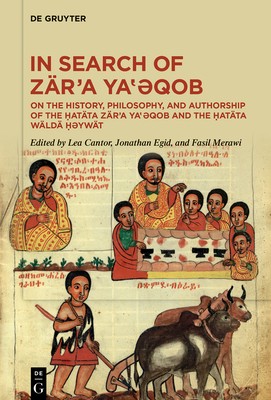
- Išsiųsime per 10–14 d.d.
- Leidėjas: De Gruyter
- ISBN-10: 3110725746
- ISBN-13: 9783110725742
- Formatas: 15.6 x 23.4 x 1.9 cm, kieti viršeliai
- Kalba: Anglų
- Extra -15 % nuolaida šiai knygai su kodu: ENG15
In Search of Zera Yacob (el. knyga) (skaityta knyga) | knygos.lt
Atsiliepimai
Aprašymas
In Search of Zera Yacob is the first multi-author volume to address a fascinating and hitherto neglected topic: two remarkable philosophical texts from Ethiopia and the ongoing debate over their authorship. These two texts, the Ḥatäta Zär'a Ya‛ǝqob and the Ḥatäta Walda Heywat, have been objects of suspicion and admiration since their discovery (or perhaps their forgery) in 1852 by the Capuchin monk Giusto d'Urbino, both for their intrinsic philosophical interest and apparent historical singularity in the Ethiopian and African contexts.
The central and structural question of this volume concerns the authenticity of the texts. More specifically, its expert contributors address the question of whether the texts have a genuine 17th century Ethiopian authorship, or whether the supposed 'discoverer' of the texts, the 19th century Capuchin monk Giusto d'Urbino, was in fact their secret author.
While the problem of the texts' authorship is a longstanding one, stretching back to the translations of Littman and Turayev, and Conti Rossini's rejection of their authenticity in the early 20th century, it is far from settled. Dissent from Ethiopian scholars such as Alkilu and Moges notwithstanding, Rossini's arguments were accepted as the scholarly consensus for much of the 20th century (e.g. Mittwoch (1934)), until Claude Sumner attempted to rehabilitate the authenticity of the Ḥatäta in the second of his five-volume Ethiopian Philosophy (1974-78). Scholars today remain starkly divided on the question of authenticity. This volume constitutes the first attempt to bring together the perspectives of scholars from both the 'traditionalist' and the 'sceptical' camps, and to provide an opportunity to articulate and consolidate the case for either side of the debate. The contributors' areas of expertise ranges from across philosophy, history, and Ethiopian Semitic philology, which will allow for an appropriately variegated and balanced assessment of the question of the authorship of the texts, the possibilities for resolving the authorship debate, and the place of the texts in philosophical and literary history.
If the first of the two works was indeed authored by an Ethiopian clergyman of the 17th century named Zera Yacob, then it is the earliest recorded autobiography and philosophical work from sub-Saharan Africa, roughly contemporary with Descartes' Discours de la méthode and the birth of modern philosophy. It will then be of central interest to anyone concerned with African philosophy and literature, the global history of philosophy and philosophical modernity, as well as those interested in the particular notions (theodicy, naturalistic ethics, cosmological arguments) raised in the text. However, if the work is in fact not authentic, and was instead composed by d'Urbino two centuries later, the work is one of the most impressive forgeries ever created, and the reasons for such an elaborate philosophical forgery, in a long dead language, will be ripe for exploration.
The stakes -- philosophical, historiographical and political -- are higher than ever, owing to the recent revival of interest in Zera Yacob and in African philosophy more generally, and the use of Zera Yacob in debates about 'world philosophy' and diversifying the philosophical canon. Before these research projects can be explored any further, however, a much more systematic and thorough assessment of the texts' authorship is in order. Accordingly, the priority of this volume is to go some of the way in resolving the authenticity dispute, with a secondary aim of drawing attention to the intricate and politically charged debate over their authenticity.
EXTRA 15 % nuolaida su kodu: ENG15
Akcija baigiasi už 4d.20:42:30
Nuolaidos kodas galioja perkant nuo 10 €. Nuolaidos nesumuojamos.

- Leidėjas: De Gruyter
- ISBN-10: 3110725746
- ISBN-13: 9783110725742
- Formatas: 15.6 x 23.4 x 1.9 cm, kieti viršeliai
- Kalba: Anglų
In Search of Zera Yacob is the first multi-author volume to address a fascinating and hitherto neglected topic: two remarkable philosophical texts from Ethiopia and the ongoing debate over their authorship. These two texts, the Ḥatäta Zär'a Ya‛ǝqob and the Ḥatäta Walda Heywat, have been objects of suspicion and admiration since their discovery (or perhaps their forgery) in 1852 by the Capuchin monk Giusto d'Urbino, both for their intrinsic philosophical interest and apparent historical singularity in the Ethiopian and African contexts.
The central and structural question of this volume concerns the authenticity of the texts. More specifically, its expert contributors address the question of whether the texts have a genuine 17th century Ethiopian authorship, or whether the supposed 'discoverer' of the texts, the 19th century Capuchin monk Giusto d'Urbino, was in fact their secret author.
While the problem of the texts' authorship is a longstanding one, stretching back to the translations of Littman and Turayev, and Conti Rossini's rejection of their authenticity in the early 20th century, it is far from settled. Dissent from Ethiopian scholars such as Alkilu and Moges notwithstanding, Rossini's arguments were accepted as the scholarly consensus for much of the 20th century (e.g. Mittwoch (1934)), until Claude Sumner attempted to rehabilitate the authenticity of the Ḥatäta in the second of his five-volume Ethiopian Philosophy (1974-78). Scholars today remain starkly divided on the question of authenticity. This volume constitutes the first attempt to bring together the perspectives of scholars from both the 'traditionalist' and the 'sceptical' camps, and to provide an opportunity to articulate and consolidate the case for either side of the debate. The contributors' areas of expertise ranges from across philosophy, history, and Ethiopian Semitic philology, which will allow for an appropriately variegated and balanced assessment of the question of the authorship of the texts, the possibilities for resolving the authorship debate, and the place of the texts in philosophical and literary history.
If the first of the two works was indeed authored by an Ethiopian clergyman of the 17th century named Zera Yacob, then it is the earliest recorded autobiography and philosophical work from sub-Saharan Africa, roughly contemporary with Descartes' Discours de la méthode and the birth of modern philosophy. It will then be of central interest to anyone concerned with African philosophy and literature, the global history of philosophy and philosophical modernity, as well as those interested in the particular notions (theodicy, naturalistic ethics, cosmological arguments) raised in the text. However, if the work is in fact not authentic, and was instead composed by d'Urbino two centuries later, the work is one of the most impressive forgeries ever created, and the reasons for such an elaborate philosophical forgery, in a long dead language, will be ripe for exploration.
The stakes -- philosophical, historiographical and political -- are higher than ever, owing to the recent revival of interest in Zera Yacob and in African philosophy more generally, and the use of Zera Yacob in debates about 'world philosophy' and diversifying the philosophical canon. Before these research projects can be explored any further, however, a much more systematic and thorough assessment of the texts' authorship is in order. Accordingly, the priority of this volume is to go some of the way in resolving the authenticity dispute, with a secondary aim of drawing attention to the intricate and politically charged debate over their authenticity.





Atsiliepimai